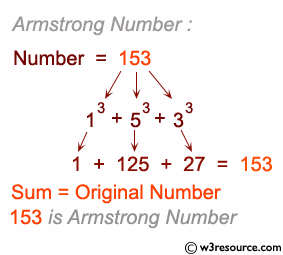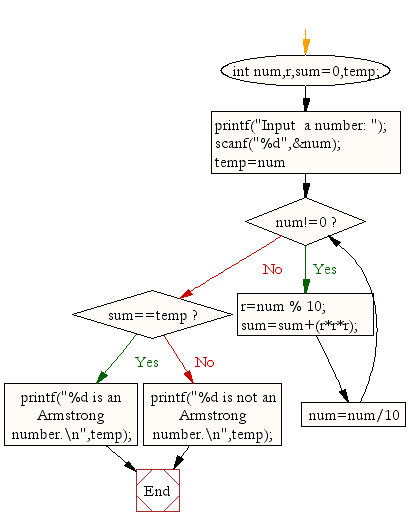C Exercises: Check whether a given number is an armstrong number or not
C For Loop: Exercise-29 with Solution
Write a C program to check whether a given number is an armstrong number or not.
When the sum of the cube of the individual digits of a number is equal to that number, the number is called Armstrong number. For Example 153 is an Armstrong number because 153 = 13+53+33.
Test Data :
Input a number: 153
Expected Output :
153 is an Armstrong number.
Pictorial Presentation:

Visualize C code execution:
The following tool visualize what the computer is doing step-by-step as it executes the said program:
Sample Solution:
C Code:
#include <stdio.h>
void main(){
int num,r,sum=0,temp;
printf("Input a number: ");
scanf("%d",&num);
for(temp=num;num!=0;num=num/10){
r=num % 10;
sum=sum+(r*r*r);
}
if(sum==temp)
printf("%d is an Armstrong number.\n",temp);
else
printf("%d is not an Armstrong number.\n",temp);
}
Sample Output:
Input a number: 153 153 is an Armstrong number.
Flowchart:

C Programming Code Editor:
Improve this sample solution and post your code through Disqus.
Previous: Write a c program to find the perfect numbers within a given number of range.
Next: Write a C program to find the Armstrong number for a given range of number.
What is the difficulty level of this exercise?
Test your Programming skills with w3resource's quiz.
C Programming: Tips of the Day
Static variable inside of a function in C
The scope of variable is where the variable name can be seen. Here, x is visible only inside function foo().
The lifetime of a variable is the period over which it exists. If x were defined without the keyword static, the lifetime would be from the entry into foo() to the return from foo(); so it would be re-initialized to 5 on every call.
The keyword static acts to extend the lifetime of a variable to the lifetime of the programme; e.g. initialization occurs once and once only and then the variable retains its value - whatever it has come to be - over all future calls to foo().
Ref : https://bit.ly/3fOq7XP
- New Content published on w3resource:
- HTML-CSS Practical: Exercises, Practice, Solution
- Java Regular Expression: Exercises, Practice, Solution
- Scala Programming Exercises, Practice, Solution
- Python Itertools exercises
- Python Numpy exercises
- Python GeoPy Package exercises
- Python Pandas exercises
- Python nltk exercises
- Python BeautifulSoup exercises
- Form Template
- Composer - PHP Package Manager
- PHPUnit - PHP Testing
- Laravel - PHP Framework
- Angular - JavaScript Framework
- Vue - JavaScript Framework
- Jest - JavaScript Testing Framework
